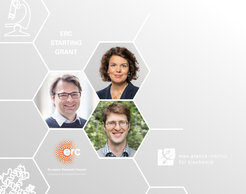Three ERC Starting Grants for Group Leaders at the MPIB

Hannes Mutschler investigates ancient protocells
Life on Earth appeared about 4 billion years ago and since then has developed through progressive evolution into the incredible variety of forms of today's plants, animals and microorganisms. Intriguingly, every modern form of life consists of biochemically very similarly constructed cells and it is assumed that all life on Earth originates from more primitive "protocells". These protocells were completely replaced in the course of biological evolution. The absence of these precursors makes it very difficult to study the emergence and properties of primitive life and thus to learn more about the general conditions for the formation of life. With the ERC Starting Grant, Hannes Mutschler's research group “Biomimetic Systems” will focus on the generation of model microorganisms in order to investigate postulated transition forms between protocells and modern cells.
Hannes Mutschler conducted his doctoral research at the MPI for Medical Research in Heidelberg and received his PhD from the Heidelberg University. Supported by a FEBS Long-Term-Fellowship, he worked as a postdoctoral researcher at the MRC Laboratory of Molecular Biology (UK) before he joined the MPI of Biochemistry as an independent MaxSynBio Junior Research Group Leader.
Danny Nedialkova analyzes the early life of proteins
Proteins execute the vast majority of processes in a living cell. Although they are made as linear chains of amino acids, they fold into various three-dimensional shapes to accomplish their tasks. Failures in this folding process can be catastrophic for cells and build-up of misfolded proteins is a hallmark of aging and neurological disorders. Proteins start to fold as they are synthesized on ribosomes, the cellular machines that translate messenger RNA into amino acid chains. The research group "Mechanisms of Protein Biogenesis", led by Danny Nedialkova, aims to understand how events during messenger RNA translation shape cellular proteomes. “A protein’s “formative years” occur during its synthesis”, says Nedialkova. “We will use a suite of systems approaches to define how protein synthesis and folding synergize in healthy cells, and how this synergy’s failure causes disease.”
Danny Nedialkova earned a doctoral degree from Leiden University (The Netherlands). After postdoctoral work at the MPI for Molecular Biomedicine (Münster, Germany), she became a Max Planck Research Group Leader at the MPI for Biochemistry. She holds a joint appointment as a tenure-track professor in the Department of Chemistry at the Technical University of Munich.
Karl Duderstadt investigates the preservation of the DNA blueprint of cells
The unique instructions for each organism are stored in DNA. To fit in cells, the DNA is twisted and compacted into chromosomes. During cell division, a large molecular machine, known as the replisome, unpackages and duplicates chromosomes to produce copies for the daughter cells. Mistakes during this process can have disastrous consequences leading to unstable inheritance and underlying many severe human diseases. The structure and operation of the molecular machine that conducts this process is not well understood. Karl Duderstadt, head of the research group "Structure and Dynamics of Molecular Machines", plans to change this by employing cutting edge imaging methods to directly observe these machines in action. These studies will reveal how the vital genetic code of life is faithfully copied and the origin of mistakes that can have disastrous consequences for future generations.
Karl Duderstadt earned a doctoral degree in biophysics from UC Berkeley. After postdoctoral training as a human frontier science program fellow at the University of Groningen (The Netherlands), he became a Max Planck Research Group Leader at the MPI for Biochemistry. He holds a joint appointment as a tenure-track professor in the Department of Physics at the Technical University of Munich.











